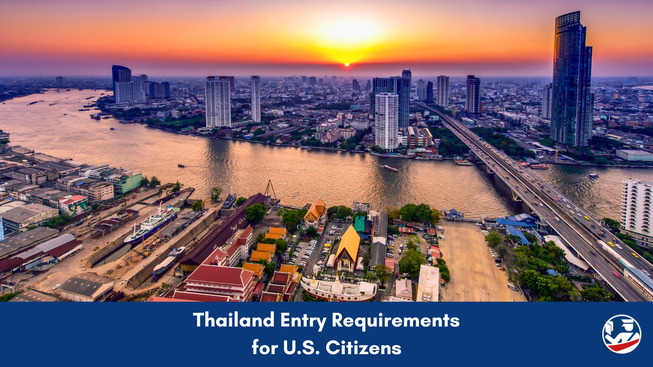
Entry Requirements for U.S. Citizens: Thailand
If you are planning a trip to Thailand, you need to follow a few simple rules before you visit the "Land of Smiles." The good news is that U.S. citizens do not need a visa to visit Thailand for most short trips. However, you must still have the right documents to show the Immigration Officer when you arrive.
This guide covers all the important information you need to know and the steps you need to take before your trip to Thailand, from your passport details to the current visa exemption rules, so you can focus on planning and enjoying your trip.
Quick Summary: Thailand Entry Rules
| Requirement | Current Rule |
|---|---|
| Visa Required | No (for stays up to 60 days). |
| Maximum Stay | 60 days (Exemption); can be extended for 30 more days. |
| Passport Validity | At least 6 months' validity beyond your date of entry. |
| Digital Form | The Thailand Digital Arrival Card (TDAC) is required. |
| Proof of Funds | You may be asked to show proof of 20,000 THB (per person) in cash. |
US Passport & Thailand Visa Requirements
Before you plan your trip to Thailand, make sure you have the documents required for entry and that those documents meet Thailand's entry rules.
U.S. Passport Validity
To travel to Thailand, your U.S. passport must be valid for at least 6 months beyond the date of entry, and your passport must have at least one blank page for entry and exit stamps. If your passport expires too soon, you could be denied entry by the Thai government. Check your passport's remaining validity and renew it as soon as possible, if needed.
Thailand Visa Exemption and Requirements
- Visa Exemption: U.S. citizens are exempt from the visa requirement for tourist visits of up to 60 days. You will get a free entry stamp upon arrival.
- Important Frequent Travel Warning: If you use the visa exemption too many times in a row, Immigration Officers may question you. They might deny you entry if they believe you are attempting to stay in Thailand by avoiding the requirement for a long-term visa.
- Visa Requirement: For stays longer than 60 days, all foreign visitors must obtain a visa (i.e., Thailand Tourist Visa or Non-Immigrant Visa) from a Thai embassy or consulate before traveling to Thailand.
Need a simple, reliable way to apply for your Thailand E-Visa (for longer stays)?
Start your Thailand E-Visa application quickly and securely with iVisa today! Let the experts help you gather your documents and ensure your application is perfect!
Additional Thailand Entry/Exit Requirements
- Thailand Digital Arrival Card (TDAC): Regardless of the duration of your stay, all travelers must complete the Thailand Digital Arrival Card (TDAC) online before arrival. This travel document is mandatory for all foreign travelers of all ages.
- Entry points: Entry to Thailand is possible by air, land, or sea at official ports of entry. You must also be prepared to provide your travel plans upon entry to Thailand and show that you can financially support yourself for the duration of your stay.
- Onward or Return Ticket: Immigration officers may ask to see proof that you have a ticket to leave Thailand within the 60-day limit. This proof may be in the form of a ticket to return home to the U.S. or a ticket for onward travel outside of Thailand. Overstaying your visit (even by 1 day) results in fines and possible bans on reentry.
- Proof of Funds: You may be required to demonstrate that you have sufficient funds for your trip. The rule is at least 20,000 Thai Baht (THB) per person (or 40,000 THB per family) in cash.
Minors Traveling to Thailand
Minors are required to provide the same entry requirements as adults to enter Thailand.
- Parental Consent: While not required, it is highly recommended that minors traveling alone or with only one parent/guardian carry a notarized parental consent letter for a hassle-free stay.
Health & Safety for Your Trip to Thailand
Here are the essential things U.S. citizens need to know about staying healthy and safe while traveling to Thailand.
Health Rules
- Routine Vaccines: No vaccinations are required if you are flying directly to Thailand from the U.S..
- Yellow Fever: You must have a Yellow Fever vaccination certificate only if you are arriving from or have recently traveled through a country with a risk of yellow fever (check the CDC’s latest list before you go).
- COVID-19: Thailand has no COVID-19-related entry requirements (no testing or vaccine proof is required).
- Health insurance: Not required for entry, but strongly recommended as medical care must be paid for upfront.
Safety Advisory
- The U.S. government advises that travelers use normal caution in most of Thailand.
- However, they advise Do Not Travel (Level 4) to the provinces of Yala, Pattani, Narathiwat, and parts of Songkhla due to periodic violence.
Essential Travel Resources for Your Next Trip to Thailand
- Travel Insurance – Protect your trip with trusted, affordable coverage for medical emergencies, cancellations, and more.
- Flights & Hotels – Find the best deals on flights and accommodations worldwide with Booking.com’s powerful search engine.
- Tours & Local Experiences – Discover unforgettable experiences with top-rated local tours and activities in every destination.
- eSIMs & Phone Plans – Stay connected abroad with affordable eSIM data plans—no physical SIM card required.
- Luggage & Travel Gear from Amazon's Best Sellers – Shop the most popular backpacks, luggage, and travel accessories travelers swear by.
- Rocket Languages Award-Winning Courses – Learn a new language fast with immersive, self-paced courses loved by travelers.
- Registered Passport Courier Services – Need your passport fast? Use trusted expediters to save time and avoid stress.
Thailand Entry Requirements Frequently Asked Questions (FAQ)
A: No, not for short stays. U.S. citizens can use the Visa Exemption Scheme to enter Thailand for up to 60 days without applying for a visa.
A: Yes. You can extend your stay once for an additional 30 days at a local Immigration Office for a fee (1,900 THB). You must apply for an extension request (form TM7) before your initial stay expires.
A: Yes. Your passport must be valid for at least 6 months beyond your date of entry into Thailand.
A: Only if you are arriving from or have recently traveled to a country with a Yellow Fever risk. Otherwise, the Yellow Fever vaccination is not mandatory.
A: Overstaying your permitted time is illegal. You will face a fine of 500 Thai Baht for every day you overstay, and could face detention and a future travel ban.
A: No special authorization is officially required, but a notarized parental consent letter is always recommended if a child is traveling alone or with only one parent.
Need a simple, reliable way to apply for your Thailand E-Visa (for longer stays)?
Start your Thailand E-Visa application quickly and securely with iVisa today! Let the experts help you gather your documents and ensure your application is perfect!
In a hurry? Apply online to get your visa, e-visa, ETA or eVOA fast.
Essential Travel Resources for Your Next Adventure
- Travel Insurance – Protect your trip with trusted, affordable coverage for medical emergencies, cancellations, and more.
- Flights & Hotels – Find the best deals on flights and accommodations worldwide with Booking.com’s powerful search engine.
- Tours & Local Experiences – Discover unforgettable experiences with top-rated local tours and activities in every destination.
- eSIMs & Phone Plans – Stay connected abroad with affordable eSIM data plans—no physical SIM card required.
- Luggage & Travel Gear from Amazon's Best Sellers – Shop the most popular backpacks, luggage, and travel accessories travelers swear by.
- Rocket Languages Award-Winning Courses – Learn a new language fast with immersive, self-paced courses loved by travelers.
- Registered Passport Courier Services – Need your passport fast? Use trusted expediters to save time and avoid stress.


